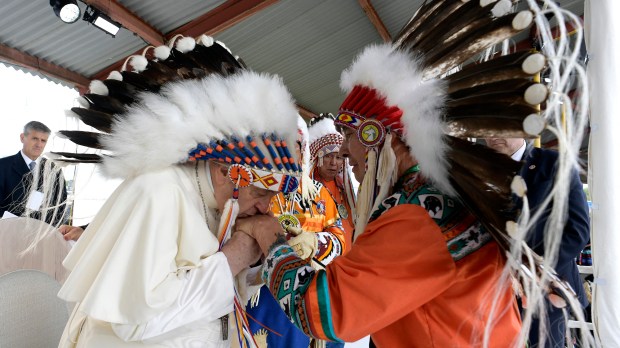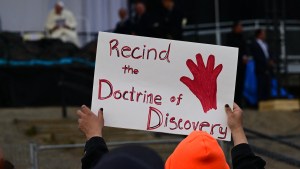“No power — political, economic, ideological — is entitled to unilaterally determine the identity of a nation or social group,” Pope Francis wrote in a message on March 31 to judges and scholars participating in a workshop on colonialism organized at the Vatican. The Pope was addressing not just the colonialism of centuries ago, but that which is occurring today.
This message came a day after the Holy See repudiated a 15th-century doctrine that was used to legitimize the colonization of indigenous territories, emphasizing again Pope Francis’ commitment to respecting the dignity and culture of all peoples.
“The subjugation and plunder of peoples through the use of force or cultural and political penetration is a crime […] because there are no chances for peace in a world that discards populations and oppresses to loot,” the Pontiff continued in his message, which focused on explaining what colonialism means today and how it has changed across the centuries.
Francis’ written message was delivered to the participants of the workshop “Colonization, Decolonization and Neocolonialism from the Perspective of Justice and the Common Good.” It was held at the Vatican March 30-31 and organized by the Pontifical Academy of Social Sciences and the Pan-American Committee of Judges for the Social Rights and Franciscan Doctrine (COPAJU). At the time of the workshop Pope Francis was receiving treatment at the Gemelli hospital in Rome for bronchitis.
The issue of ideological colonialism
“If ‘technically’ in the 21st century we can no longer speak of geographically ‘colonized’ nations, although there are some, the term ‘colonialism’ is still commonly used today, especially in an economic and ideological sense,” the Pope explained, highlighting how this phenomenon has thus changed its form. Today, colonialism “is virtualized, camouflaged, hidden, making it difficult to detect and neutralize it.”
As an example, Francis cited the situation of the Democratic Republic of the Congo, which he visited in the beginning of February 2023. Although it is an independent nation, the Pontiff highlighted that it still suffers from the exploitation of its resources and conflicts of interests within its territory and that many other nations live analogous experiences.
The Pope also cited ideological colonialism as an “equally relevant” form of this phenomenon that is “often intertwined” with the economic and political aspects. Francis often condemns ideological colonialism in his speeches as a concept that reduces people’s freedom and cultural expression. In the March 31 message, Pope Francis defined it as something that “stifles the natural bond between peoples and their values, by trying to eradicate their traditions, history, and religious beliefs.”
“Ideological colonialism tends to standardize everything,” he added. “It obeys a mentality that doesn’t tolerate differences and focuses only on the present, on individual needs and rights, often neglecting duties towards the weakest and most fragile.”
He also suggested reading a 1907 novel by Robert Hugh Benson, The Lord of the World, to truly understand ideological colonization.
The Holy Father often uses the term ideological colonization in reference to issues related to sexuality, specifically gender ideology. For examples see here.
The need to study this phenomenon to confront it
“It seems like several centuries of bloody and inhumane historical strife haven’t served to develop a global idea of liberation, self-determination and solidarity between nations and between human beings,” the Pope continued, saying colonialism has just become more “refined and subtle” today.
He thus encouraged the scholars in their work, saying the sciences, academies and forums play a “transcendental role” in either becoming “factors of liberation” or, conversely, “driving the domination of peripheral peoples” and “ideological colonization.”
“We are asked to make the necessary effort to put an end to neocolonial practices and their expressions of racism and social segregation that descend from them sooner rather than later,” the Pontiff said. “There will be no peace if, in the representative political systems, there is no real integration of the excluded peoples.”
An apology and the repudiation of the Doctrine of Discovery
At the end of his message, Pope Francis “once again” asked for “forgiveness for the acts of some believers who in the past directly or indirectly contributed to the processes of political and territorial domination of various peoples in America and Africa” and for “any errors or omissions that have occurred or are occurring.”
The day before this message, the Holy See repudiated the “Doctrine of Discovery,” a concept scholars trace to three papal bulls (decrees) from the 15th century that were seen to legitimize European colonization of indigenous territories. The statement rejecting this idea was released nine months after Pope Francis’ “penitential pilgrimage” to Canada, as part of a reconciliation process with the local Indigenous populations. In the 19th century these populations suffered many types of abuses at residential schools run by the government and sometimes by religious congregations of the Church.
During the trip certain activists had called for the Church to revisit this doctrine. While in the North American country, Pope Francis also apologized to the Indigenous populations for the errors people of the Church had committed.


